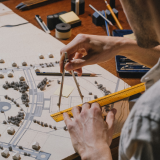Charters and doctrinal texts
All ICOMOS doctrinal texts are distributed under the Creative Commons licence “Attribution-NonCommercial-NoDerivatives CC BY-NC-ND”.
This license allows you to download and share the texts freely, provided that you credit ICOMOS by name and do not modify them in any way.
Venice Charter
International Charter for the Conservation and Restoration of Monuments and Sites (Venice Charter) - 1964
Charters adopted by the General Assembly of ICOMOS
Interpretation and presentation
ICOMOS Charter on the Interpretation and Presentation of Cultural Heritage Sites - 2008

Education and training
Guidelines for Education and Training in the Conservation of Monuments, Ensembles and Sites - 1993

Heritage documentation
Principles for the recording of monuments, groups of buildings and sites - 1996

Archaeological heritage
Charter for the Protection and Management of the Archaeological Heritage - 1990
Salalah Guidelines for the management of Public Archaeological Sites - 2017

Architectural heritage
ICOMOS Charter – Principles for the Analysis, Conservation and Structural Restoration of Architectural Heritage - 2003

Cultural landscapes
ICOMOS-IFLA Principles concerning Rural Landscapes as Heritage - 2017

Cultural routes
ICOMOS Charter on Cultural Routes - 2008

Cultural tourism
Charter of Cultural Tourism - 1976
International Cultural Tourism Charter - Managing Tourism at Places of Heritage Significance - 1999
ICOMOS International Cultural Heritage Tourism Charter - 2022

Historic cities, towns, villages and gardens
Historic Gardens (Florence Charter) - 1981
Charter for the Conservation of Historic Towns and Urban Areas (Washington Charter) - 1987
Valletta Principles for the Safeguarding and Management of Historic Cities, Towns and Urban Areas - 2011
Document on Historic Urban Public Parks - 2017

Industrial heritage
Joint ICOMOS – TICCIH Principles for the Conservation of Industrial Heritage Sites, Structures, Areas and Landscapes (Dublin Principles) - 2011

Intangible cultural heritage
International Charter and Guidance on Sites with Intangible Cultural Heritage - 2024

Military heritage
ICOMOS Guidelines on Fortifications and Military Heritage - 2021

Mural paintings
ICOMOS Principles for the Preservation and Conservation-Restoration of Wall Paintings - 2003

Polar heritage
ICOMOS Antarctic Archaeological Guidelines - 2022

Underwater cultural heritage
Charter on the Protection and Management of the Underwater Cultural Heritage - 1996

Vernacular architecture
Charter on the Built Vernacular Heritage - 1999

Wood
Principles for the Preservation of Historic Timber Structures - 1999
Principles for the Conservation of Wooden Built Heritage - 2017
